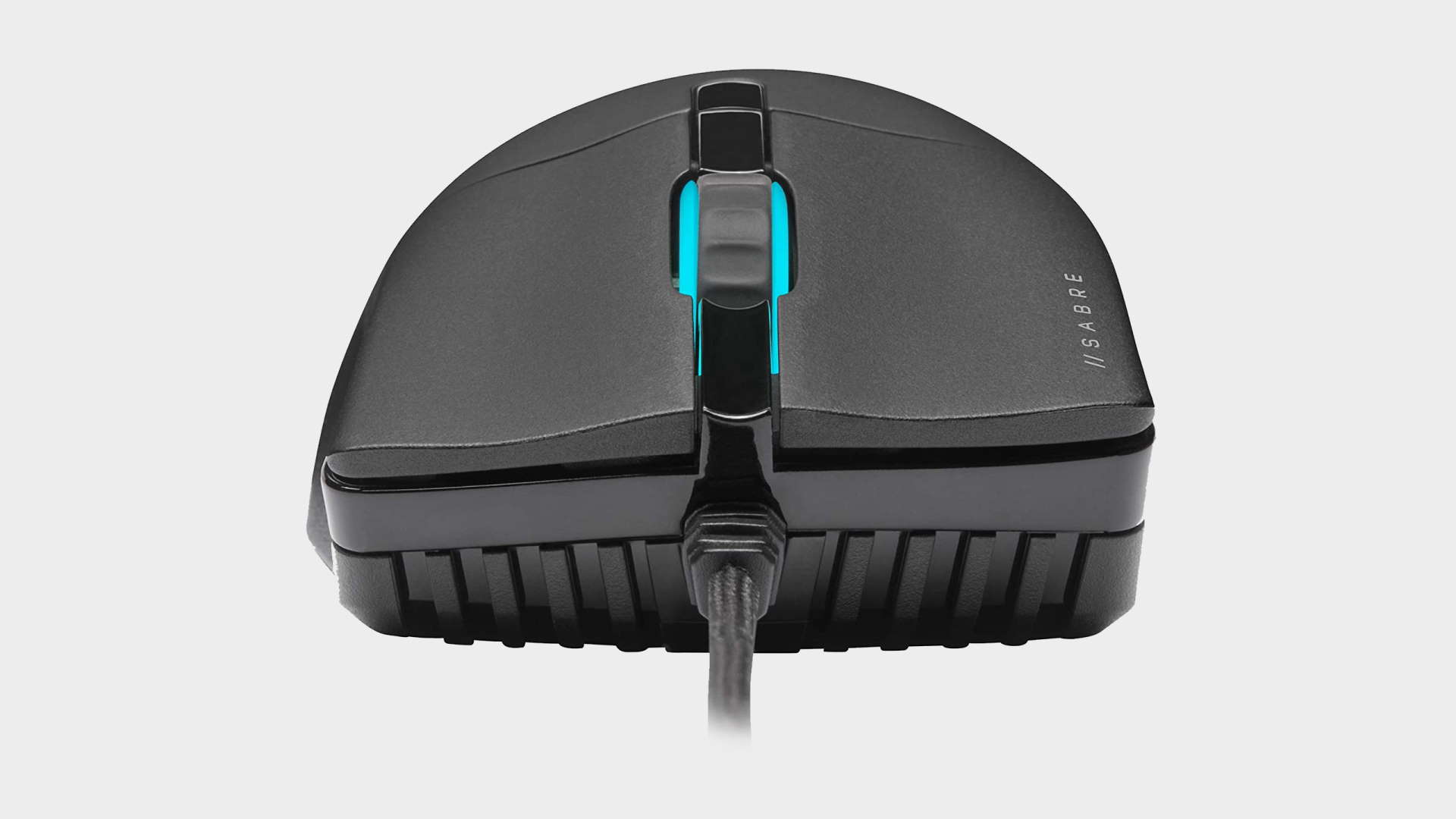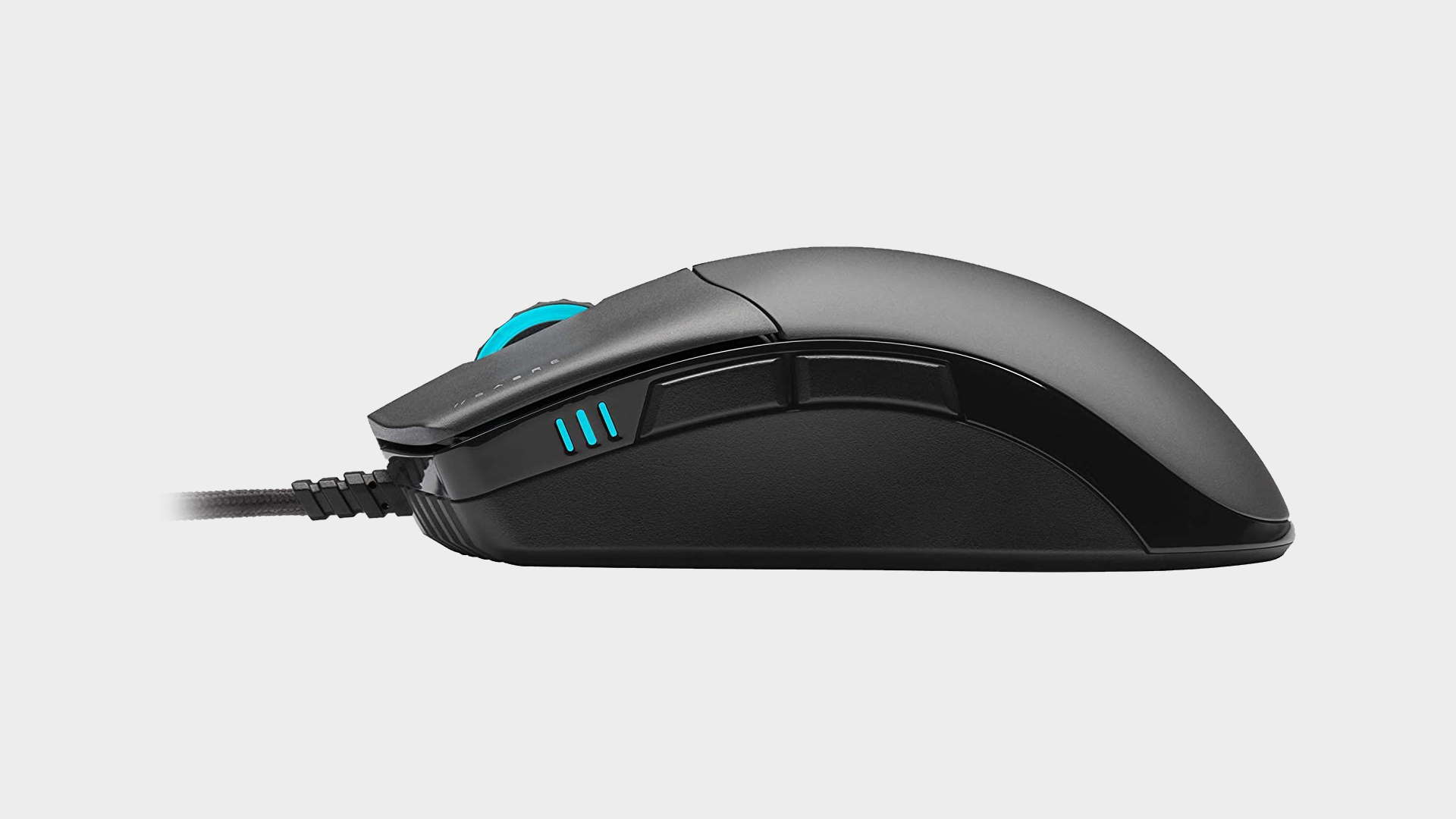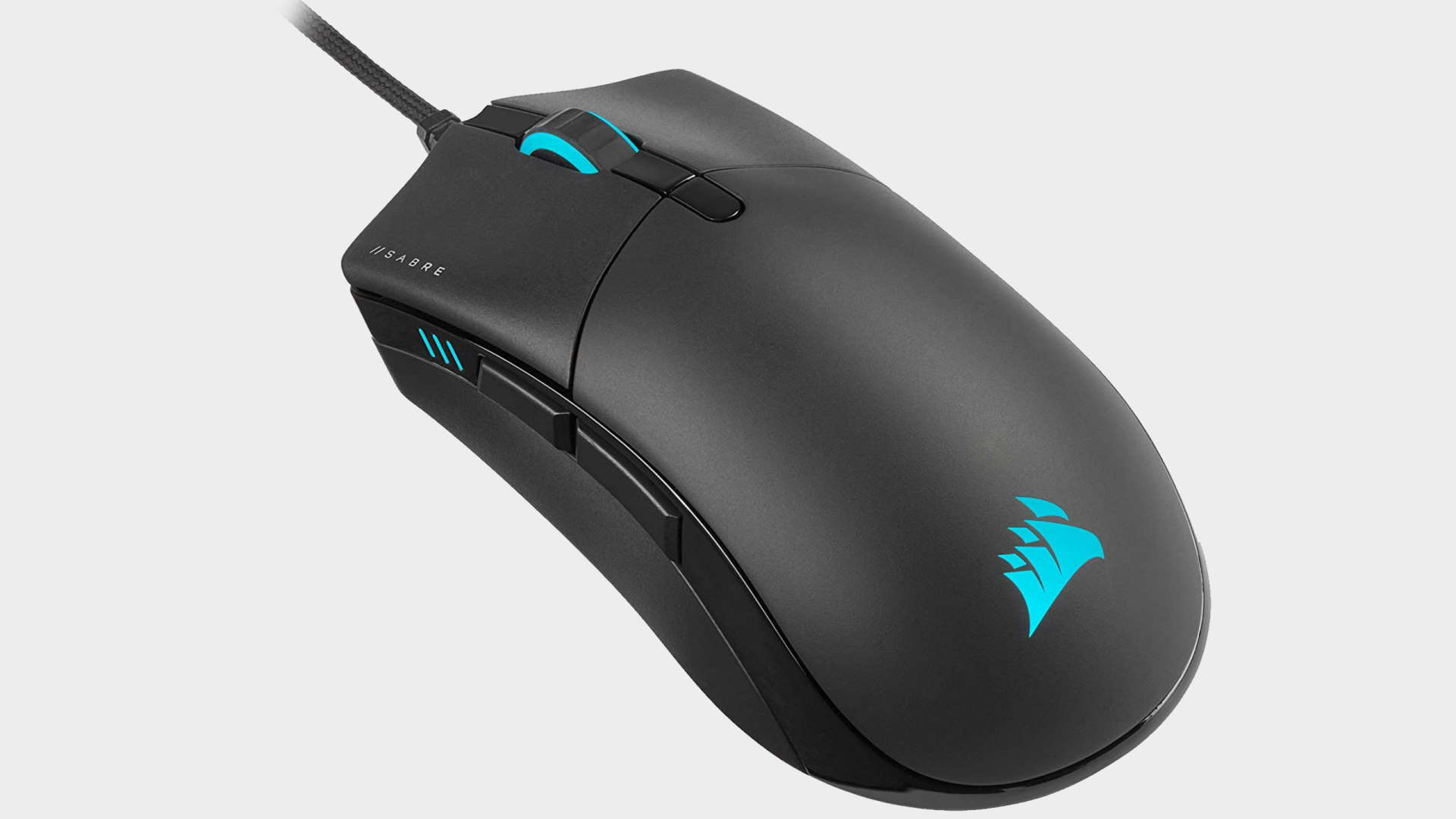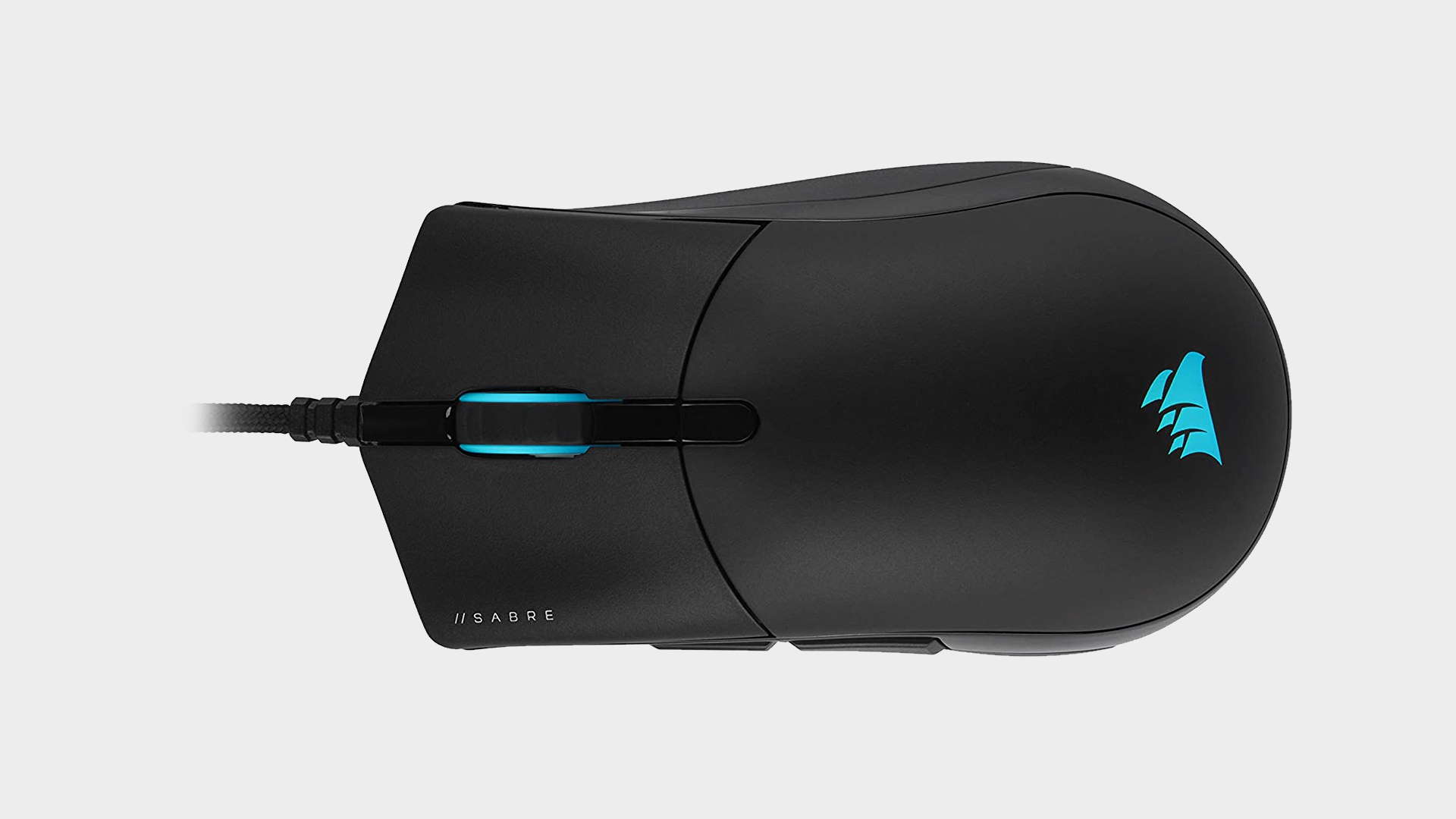Our Verdict
Corsair just delivered one of the best lightweight wired competition ready gaming mice at an astonishing $60.
For
- Fantastic ergonomics and comfort
- 8K polling and 18,000DPI sensor combo
- Feels like a wireless mouse
Against
- Even better wireless
- 8K polling requires powerful hardware
PC Gamer's got your back
The Corsair Sabre RGB Pro Champion Series optical gaming mouse is yet another gaming peripheral with a terribly excessive name. One that means absolutely nothing to me as a consumer. That said, what Corsair has done here is the furthest thing from the usual gamer excess. It strips away everything unnecessary to deliver a light 74g, high-performance esports mouse, at an impressive $60.
When I pulled it out of the box, I was struck by how simple it looks. Corsair didn't waste any resource on fancy edgy designs, rainbow RGB, or punching holes in the shell. And while it might look simplistic, it's more closely akin to a Katana sword than Iron Man's suit.
The shape is almost symmetrical, fitting snugly in the palm for a confident grip that won't slip or slide. The tapered sides allow your thumb and pinky to rest comfortably. Some might find it a little big but I found it perfect for my usual palm grip.
The main mouse buttons and thumb buttons are slightly textured, different from the rest of the mouse, which improves grip. There are two chunky thumb buttons that are as satisfyingly clicky, as are the main mouse buttons. These use Corsair QuickStrike switches, a design which leaves zero gap between the buttons and their OMRON switches. So this apparently makes them faster, more responsive, and consistent. But I honestly didn't feel any difference compared with my old Razer Basilisk Ultimate.
Programmable buttons: 6
Sensor: 18,000 DPI PMW3392
Sensor type: Optical
Mouse backlighting: 2 Zone RGB
On board memory: Yes
Mouse button Type: Omron
Connectivity: Wired
Report rate: 8,000Hz
Grip type: Palm, Claw
Weight tuning: No
Price: $60
At the front of the thumb well is an LED indicator that shows which DPI preset the mouse is on at any given time. It's got three light bars which alternate when you switch the DPI using the button located behind the scroll wheel. You can adjust the presets using the Corsair iCue software which also saves them directly to the mouse.
Thanks to the 18,000 DPI optical sensor, you can have steps from as low as 100 all the way to 18,000 DPI. I'm not sure you'd ever use that high a DPI as I've found anything between 600 and 1800 more than adequate for gaming and work.
But what makes the Sabre Pro really special is the 8,000Hz polling rate. That essentially beams your commands to the computer eight times faster than the standard 1,000Hz on most gaming mice. Again, I couldn't feel the difference in responsiveness and I had no scientific way to measure it, but someone better than me will find more use for this high speed. One for the pros, maybe.
A word of warning though—Corsair says the AXON Hyper-processing technology required to sustain this high speed polling will require a beefy CPU to keep up. You'll get a warning in iCUE every time you activate the 8K polling, but since I was testing this on an Alienware R11 with an i9-10900K processor, I never noticed any performance issues. That said, if you have a lower performance processor, like a quad-core i3 Intel, you might see some degradation in performance.



And that's not all the iCUE software allows you to change. There are plenty of controls to fine tune the Sabre Pro to your particular liking. You can also adjust the two zone RGB lighting found on the Scroll wheel and the Corsair logo at the back of the mouse. The RGB is impressively bright, though I didn't find the customizations flexible or interesting enough beyond just having static or rotating colours. I'd have loved some more gradient, or flowing color effects.
Each of the Sabre Pro's six buttons can also be reassigned in iCUE. The Macro editor is pretty simple to capture and assign to any key of your choice.
What I found strange is the lack of presets for popular games such as you'd find in Razer Synapse. This would be handy when creating different mouse profiles which, by the way, you can assign to specific games. This way, anytime you change an app or game, iCUE will automatically change the mouse profile settings. Nice.
Additionally, Corsair gave the Sabre Pro a drag-reducing Paracord USB cable that won't slowdown those hyperfast polling signals, or your fast hand movements, by dragging along the surface.
Speaking of which, there are also replaceable 100% PTFE glide pads which I found to be very smooth across my mousepad. I very much prefer wireless mice but the fact that I barely ever remembered that the Sabre Pro was tethered is a good sign that the paracord works as advertised.
I'm hugely impressed with what Corsair has done with the Sabre Pro. For $60, you are getting a hell of a performer and it's cheaper than Razer Viper 8KHz.
The 8,000Hz polling paired with an 18,000DPI sensor is definitely overkill for most gamers but pro's will appreciate the design choices that make this excellent for competitive play. For the rest of us mortals, this is a comfortable, responsive mouse that gives you great bang for your buck, and easily one of the best wired gaming mice I've ever used.
Corsair just delivered one of the best lightweight wired competition ready gaming mice at an astonishing $60.
Kizzy is the consummate geek, with black turtleneck design sensibilities, always on the hunt for the latest, greatest, and sexiest tech. He's played Doom on the OG Pentium and still remembers how to hack a dial-a-phone. After four decades of being crazy about tech, he's literally just getting started. It's the age of the geek, baby!



